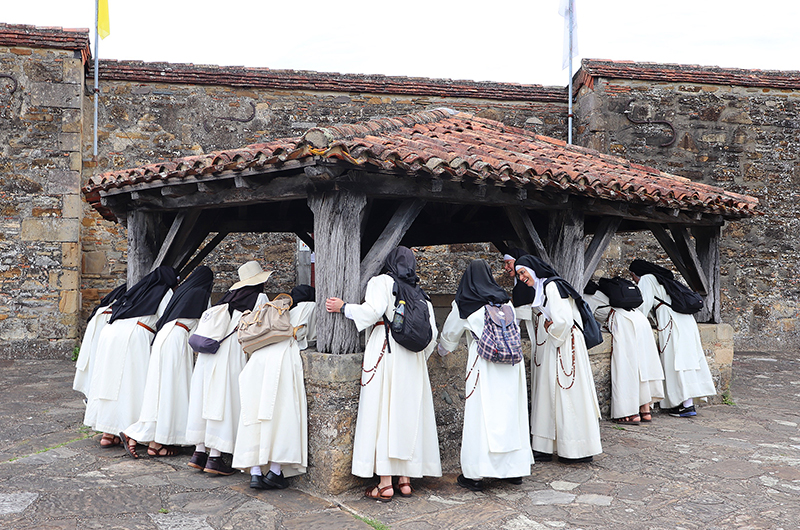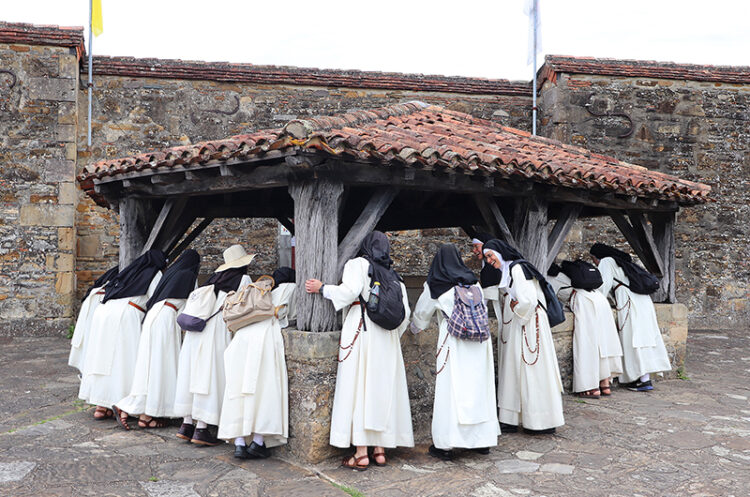(Ephesians 5:8)
Parents, leaders, and educators, we have a mission, a duty to lead children's souls toward the Light which will be their guide and their happiness. In order to illuminate the way that lies before each one of us, once a week we invite you to discover some of the words of certain wisemen and witnesses, measuring their worth by the words of St. Thomas Aquinas: “Do not consider the one who speaks, but whatever good you hear from him, confide it to your memory.” (from The Sixteen Ways to Acquire the Treasure of Knowledge by St. Thomas). Happy reading!

Genevieve was unconscious of self. She existed now only with regards to these men, by them, and for them. Without knowing it, the little girl of Labatut had drawn up from the past the long line of her ancestors, a cohort of phantoms who always served and who knew what sacrifice was. Her DNA was made up of panache, and if nobility has a heart, then it beat in the chest of this woman. Her veins flowed with iron blood, a blue blood which gave her strength. She was not afraid of contamination, and she never fled from oozing sores, or horrible wounds. With a grace-filled smile, and a gentle hand on the forehead, she calmed the distraught, pacified the tormented, and accompanied the dying. Her eyes were a reference point, a lighthouse in the swirling mists: the men well understood this, and called for her nonstop. Suffering soldiers become like little children, and so she would reassure them constantly and speak of the future. “Genevieve, promise me that I’m not going to die,” begged one of the wounded – but sometimes she couldn’t promise… so she did what was necessary, holding his hand she would accompany the dying soldier who, not even knowing his own name anymore, sensed that the end was near. Everyone begged for her to be near them. Genevieve no longer even belonged to herself. But the defeat was coming – the French knew that they could no longer hold off the offensive of the Viêt-minh. On May 7th, at 5 pm, the big guns went silent, and the long and interminable wait began. Genevieve admirably continued taking care of “her wounded,” even though the enemy had requisitioned all the medical supplies. When the Viêt-minh wanted to repatriate her to Hanoi, she refused to abandon the soldiers. Finally, on May 24th, after seventeen days of captivity, she said goodbye to Dr. Grauwin and to her fellow sufferers, and climbed aboard a Beaver military plane which repatriated her to Luang Prabang. On June 8th, on the front page of Paris Match, France discovered the face of the one whom the world would soon call “The Angel of Dien Bien Phu.” She was an angel who, with astonishing humility, always said to whatever journalist who came to interview her during her long life: “I was only doing my duty…”
Marie-Laure Buisson (1967)
Author of The Angel of Diên Biên Phu
“I realized that Genevieve was entitled to a place in the great procession of extraordinary young women which went on without a break for over eight years in Indo-China. Genevieve de Galard was just such another like ‘la Deche’, the one they called the beggar girl because the day after she got her pay it all went into the pockets of the lads she looked after. She was welfare assistant to a battalion of the Ninth Colonial Infantry Division, tireless in her work, adored by the whole battalion, from the second classes to the major, whose name was Langlais. One night, around midnight, she walked into the hospital at Lanessan at the head of a procession of water buffaloes, bulls as well as cows, and a huge flock of ducks, saying, “These are to supplement the diet of the wounded”! Genevieve was just another like Suzy Poirier, who got a bullet wound in the head while at the wheel of her ambulance on the Cao-Bang road. Another like Aline Lerouge, a fearless ambulance driver, who once plunged with her vehicle into an icy river in Tonkin. She was to be seen on every road in the country. In the course of an operation along the Phu-Ly dyke in 1947, the Half-Track in front of her was attacked by a sniper and the driver killed. She instantly handed over the wheel of her ambulance to the girl with her, jumped into the Half-Track and drove off. Some hundred yards further on there was more shooting from the direction of the rice-field. She got out on the embankment, threw herself down and emptied her rifle at the enemy: she took a Viet bullet to her lung. Another like Marguerite, Aline’s colleague, who had earned her degree in philosophy, and was very calm and serene. When the Cao-Bang convoys were being attacked she could be seen headed straight for the front of the column, cigarette in her mouth, while all around her the escort troops had taken refuge in the ditches. Another like Odette, in the winter of 1947, in the River Claire country, who, by my side, did over a hundred and sixty miles on foot, from Tuyen-Quang to Hanoi. She was like others of this great company – Mathy, Poupart, Bauge, Sage, Sorin – all nurses, girls with great hearts, full of love, vowed to the service of the wounded for eight years in Indochina. They would come back on duty at midnight or two in the morning just to see if the thorax they had attended earlier was still bleeding. No, it wasn’t really that – they came simply to give assurance, “It’s all right, don’t worry, I’m here, and I’ll soon be back, at half past seven!” Another of them was Minouche, an ambulance nurse, who also was one who handed over her pay to the lads she drove. She was known and loved all over Tonkin and Cochinchina, from north to south and east to west. Once at Bui-Chu the telephone rang to announce that some men had been badly wounded four miles away. It was just before dawn and the road had not yet been opened up. She drove right through, opening the barrier herself! Another of them was Robinet, an anesthesiologist. She had put thousands of soldiers to sleep, in North Africa, in Italy, in Germany and, of course, in Indochina. She fell last year on the deck of a river transport at Quang-Tri – her stomach perforated by Viet bullets. Asked one day to scribble ‘a few words’ in the memories album of the girls who drove the Cao-Bang ambulances, I wrote: “A man who is wounded in battle becomes for you a sort of demi-god and you spare him nothing!”
Major Paul-Henri Grauwin (1914-1989)
Author of Doctor at Diên Biên Phu / Geneviève de Galard (1925-2024)
In the same category « Education – Pedagogy », also read :

